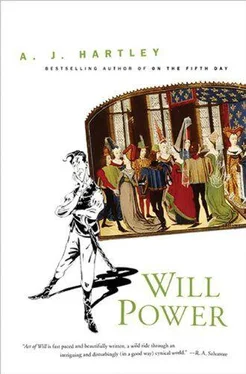A. Hartley - Will Power
Здесь есть возможность читать онлайн «A. Hartley - Will Power» весь текст электронной книги совершенно бесплатно (целиком полную версию без сокращений). В некоторых случаях можно слушать аудио, скачать через торрент в формате fb2 и присутствует краткое содержание. Год выпуска: 2010, Жанр: Фэнтези, на английском языке. Описание произведения, (предисловие) а так же отзывы посетителей доступны на портале библиотеки ЛибКат.
- Название:Will Power
- Автор:
- Жанр:
- Год:2010
- ISBN:нет данных
- Рейтинг книги:5 / 5. Голосов: 1
-
Избранное:Добавить в избранное
- Отзывы:
-
Ваша оценка:
- 100
- 1
- 2
- 3
- 4
- 5
Will Power: краткое содержание, описание и аннотация
Предлагаем к чтению аннотацию, описание, краткое содержание или предисловие (зависит от того, что написал сам автор книги «Will Power»). Если вы не нашли необходимую информацию о книге — напишите в комментариях, мы постараемся отыскать её.
Will Power — читать онлайн бесплатно полную книгу (весь текст) целиком
Ниже представлен текст книги, разбитый по страницам. Система сохранения места последней прочитанной страницы, позволяет с удобством читать онлайн бесплатно книгу «Will Power», без необходимости каждый раз заново искать на чём Вы остановились. Поставьте закладку, и сможете в любой момент перейти на страницу, на которой закончили чтение.
Интервал:
Закладка:
A. J. Hartley
Will Power
(Will Hawthorne — 2)
To my parents, who, unexpectedly, liked the first one
— AJH
I’d like to thank my agent, Stacey Glick; my editor, Liz Gorinsky; and my wife (always my first reader), who helped make this book a reality.
Please visit my website, www.ajhartley.net, to pass along comments and see details of other projects, completed or in the works.
Thanks for reading.
A. J. Hartley
Translated from the Thrusian by
A. J. HARTLEY
It is with some trepidation that I present to the world this second installment of the Hawthorne saga. Like the first volume, Act of Will , it has been translated from the original Thrusian-as preserved in the now famous Fossington House papers-with the aid of notes left by the Elizabethan translator Sir Thomas Henby. As readers of the first manuscript will quickly see, the second volume is different in key respects from the first, and raises still more vexing questions of provenance, locale, and issues of how much of the narrative-if any-is derived from fact. My initial assumption-for reasons that will become apparent as the story unfolds-is that the work is pure fantasy, though other manuscripts from the Fossington House collection have since emerged that seem to root elements of the narrative in fact. The details of those materials will be published in a series of academic papers in forthcoming issues of Philological Quarterly , though I doubt they will hold much interest for the general reader.
Since the history of the manuscript collection is now well known, I will say only that I remain in the debt of Sir Thomas Henby, whose notes from the 1580s and ’90s remain the core of my own translation. The tone, however, is the result of my own efforts to maintain some of the precocious energy of the Thrusian original, as I did with Volume One. Due to the rushed nature of the publishing schedule, I write this before beginning even preliminary work on the other pages seemingly penned in the same language, so I am not in a position to say whether there is more of the Hawthorne Saga to come or whether these two self-contained narratives are the entirety of Mr. Hawthorne’s labors. If more come to light, I will, of course, endeavor to make them available to the public in English so that they may become more than curiosities for ethnographers and linguists.
— A. J. Hartley, 2010
SCENE I Unadulterated Hawthorne
Far be it from me to blow my own trumpet, but I was about to become a bit of a legend. We had been lying around Stavis mulling over our triumphs in Shale three weeks ago like a family of pythons that had recently gorged on a rather less fortunate family of gazelles, or whatever the hell pythons eat. Now we were going to see a little excitement. I had, I must say, been quite happy doing the python thing, but sleeping late and producing no more than bodily excretions for a whole month had started to wear a bit thin even for me. The others had, of course, tired of it rather earlier.
Garnet and Renthrette, our straight-from-the-shoulder brother and sister warriors, had been spoiling for a fight with anyone who made eye contact for a couple of weeks now. Even the generally placid, if surly, Mithos, the famed rebel and adventurer who had tormented the Empire for close to twenty years, had recently started pacing the Hide’s underground library like the proverbial caged cat. Orgos, our overly noble weapon master, had begun polishing his swords again, barely concealing a mood as black as his skin. I saw little of Lisha, our girlish but revered leader, because she was usually busy poring over maps or gathering news on Empire patrols. Yours truly-Will Hawthorne, former dramatist, actor, and con man, current apprentice adventurer, and damn-near-professional gorged python-couldn’t really see what all the fuss was about. We had solved the riddles of Shale and environs, or most of them, and had come away feeling virtuous, and, more importantly, rich.
With me so far? I hope so, because-as is now graven in theater lore-nothing kills a story like exposition. I once had to be in this play when nothing happened for twenty minutes because all this backstory had to be wheeled out for anything later to make sense. Not surprisingly, we got booed offstage a quarter of an hour in. So I’ll be moving on. That’s who we were and what we’d been doing. But by this point, even I had become conscious that-if I might milk the python metaphor one last time-the flavor of warm gazelle meat was becoming a rather distant memory.
Thanks to my investigative brilliance, this was about to change, but before we got to the adventure bit there was food to be eaten. We were dining in the Waterman, one of Stavis’s many traders’ inns, in the northwestern part of the city. It was eight o’clock, and, perhaps for the first time this season, the landlady was lighting a fire in the main hall’s grate to ward off the chill that came with early autumn. To our left was a party of wool merchants who ate nothing but baked potatoes straight from the oven: no butter, no salt, no herbs. Yet they were munching with an enthusiasm which meant they either came from somewhere that had little or no food of any kind or that they were seriously delusional. To our right was a family of ebony-skinned Trellenians swathed from head to foot in lustrous silk and eating a curry that would strip varnish. At the bar was an elderly man in dignified black, sipping Venarian claret. And on the table in front of us was a large game bird known locally as a rossel, roasted and carved to perfection, surrounded by tiny links of smoked sausage and a moat of thick, hot sauce made from tart red berries, the whole sumptuous display sitting among spinach leaves and wedges of lime, steaming invitingly. Even the wool traders’ mouths were watering.
“Where was I?” I said as the serving boy left us. “Oh yes. So then Venario is on stage by himself, lying in wait for Carizo and Bianca. His sword is drawn and he’s ready to attack Carizo and have his way with Bianca. He has a few smug words with the audience and takes his position behind one of the front pillars. Then, hearing a noise, he leaps out. But it’s not Carizo. It’s the ghost of Benario, rising out of a trapdoor and wailing: ‘See here, O cursed wretch, the gaping wounds/Which thou didst carve into my living flesh. . ’ ”
“Who’s Benario?” said Garnet.
“What? Oh,” I began, “he’s the bastard son of Duke Ferdinand, the one that Venario killed in the first act because he saw. .”
“Who’s Venario?” said Lisha.
“Who’s Venario!” I exclaimed. “Haven’t you been listening at all? All right. Venario was exiled from the court for having an incestuous relationship with his sister, who he later murdered with a poisoned pot of geraniums and. .”
“I thought you had word of a job,” murmured Mithos.
I gave him a long, pained look. “Don’t you want to hear what happens next?” I said, injured.
“Sorry,” he said, “but I thought we’d come here for a job.”
“Fine,” I replied, testily. “Fine. Right, forget the play. It’s not important. After all, I only wrote it. . ”
“All right. . ” Mithos sighed.
“No,” I inserted. “No. We are here for a job, so that’s what I’ll tell you about. Firstly. .”
“Wait a moment,” Orgos said, eyes glued to the rossel’s golden brown breast.
“Do I get to finish a sentence tonight?” I asked.
“Not yet,” said Orgos. “It would be criminal to discuss business over so excellent a feast.”
Mithos sighed again and added, without any enthusiasm whatsoever, “So serve it.”
Читать дальшеИнтервал:
Закладка:
Похожие книги на «Will Power»
Представляем Вашему вниманию похожие книги на «Will Power» списком для выбора. Мы отобрали схожую по названию и смыслу литературу в надежде предоставить читателям больше вариантов отыскать новые, интересные, ещё непрочитанные произведения.
Обсуждение, отзывы о книге «Will Power» и просто собственные мнения читателей. Оставьте ваши комментарии, напишите, что Вы думаете о произведении, его смысле или главных героях. Укажите что конкретно понравилось, а что нет, и почему Вы так считаете.












